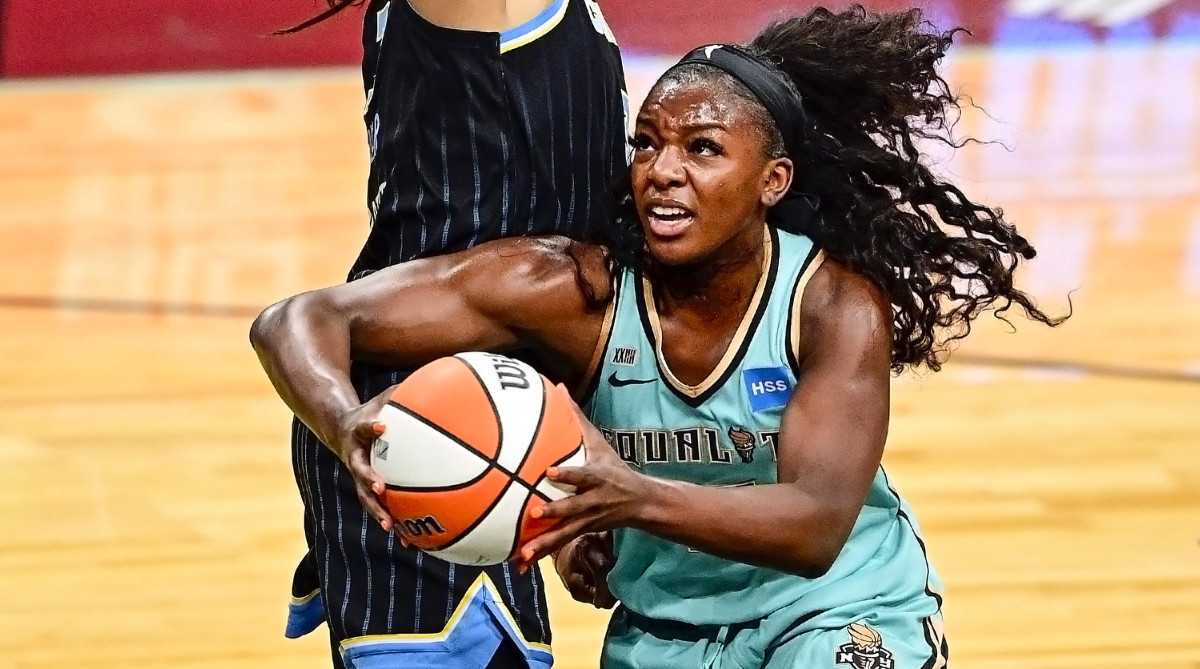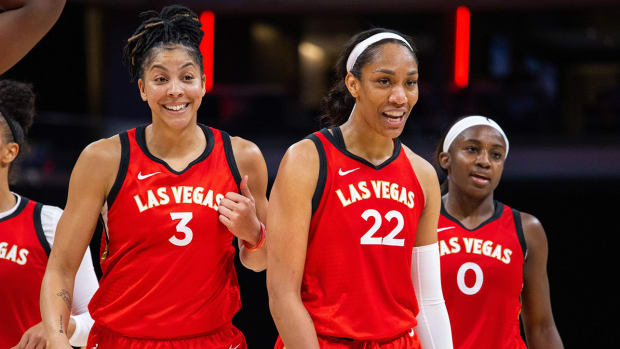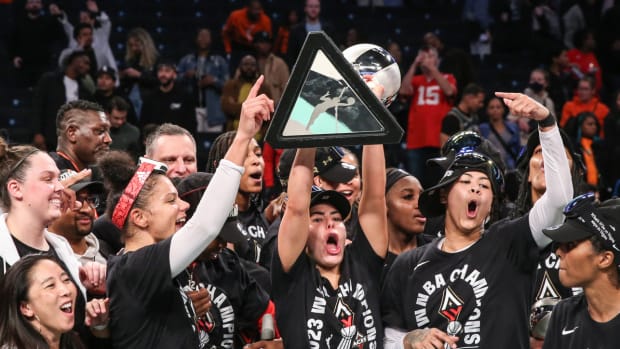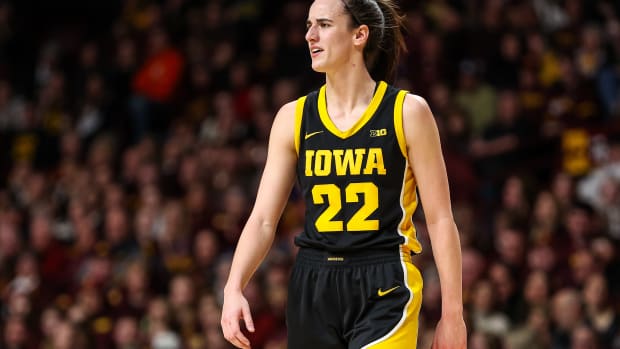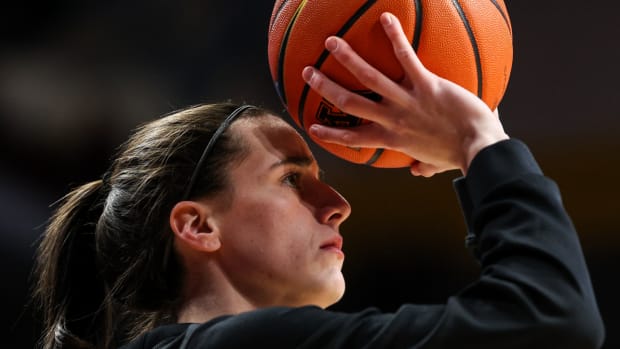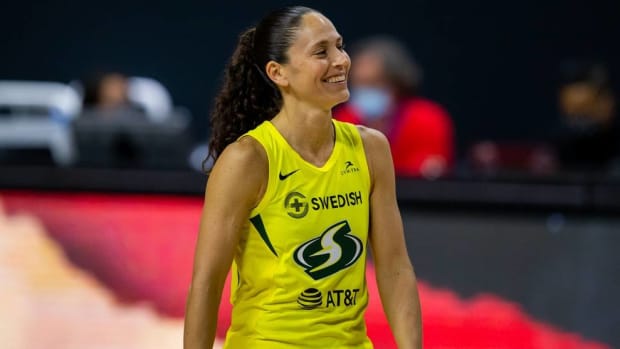Likely Rookie of the Year Michaela Onyenwere Has Surpassed Expectations
Each Thursday this season, Sports Illustrated’s Ben Pickman is diving deep into the WNBA story lines you need to know.
Michaela Onyenwere and some of her Liberty teammates sat in Arthur Ashe Stadium, the site of the U.S. Open, watching last Thursday as 19-year-old Canadian Leylah Fernandez continued her magical run to the tournament’s final by upsetting No. 2 seed Aryna Sabalenka in three thrilling sets. Throughout the evening, Onyenwere peppered her teammates with questions—her familiarity with tennis, she says, goes as far as playing it on the Wii throughout her youth.
But even without understanding the format of a tennis tiebreak, the budding Liberty star could glean lessons just by watching what was in front of her.
“Success doesn’t have an age anymore,” Onyenwere says. “You don’t have to be 30 or 40 to be successful in sport. You can be young and be just as good, if not better, than those people. So it’s definitely inspiring in that sense.”
No WNBA rookie has had more success this season than the 22-year-old forward. Entering Wednesday night’s game against the Sun, Onyenwere was the only player in her draft class averaging at least 20 minutes per game, having also played 200 more minutes than any other first-year player. She leads all rookies in points per game, is first in field goals made for rookies—both twos and threes—and is second in total rebounds. She has also quickly developed into a versatile defender for New York, playing a number of positions and often tasked with guarding the opponent’s top player.
While the Liberty’s playoff chances continue to dwindle, Onyenwere is positioned to take home individual hardware: the Rookie of the Year award.
“It would definitely be an honor,” she says. “I definitely didn’t come into this season like, ‘This is what I want to do,’ but to potentially have it, and just see how far I’ve come, and with the growth that I’ve seen in myself—I am proud of myself.”
Not only did Onyenwere enter her debut campaign not expecting to be the league’s top rookie, she had no concrete expectations at all. “I literally had none,” she says. “None.”
When she was drafted No. 6 by the Liberty, after a successful collegiate career at UCLA, she wasn’t sure what her role was going to be. So, when before a preseason scrimmage against Connecticut, coach Walt Hopkins found Onyenwere working out on an exercise bike and told her that she would be starting that day’s game, she was surprised. “Wait, what? What did you say? What do you mean I’m starting?” she remembers asking him.
With one game remaining in New York’s regular season, she has started 29 of the team’s 31 contests—the two times she hasn’t were in the past week.
Onyenwere describes her last 12 months as a whirlwind. Last fall she was still climbing up UCLA’s all-time scoring ranks—where she finished fourth—eventually leading the Bruins to a No. 3 seed in the NCAA tournament. After Texas knocked out UCLA in the second round, Onyewnere started looking ahead. She briefly moved back home to Colorado, planned a virtual draft party (and got drafted) and eventually settled into an apartment in Brooklyn. “You definitely can’t prepare for it,” she says. “But I’ve been having so much fun that it’s easy to forget I’ve been playing basketball since November.”
Throughout the season, Onyenwere has worked to adjust to the league’s pace of play and physicality. Now, she says, she’s more comfortable inviting contact and finishing in light of it. On Wednesday night, she flashed her improved offensive arsenal, scoring 14 points while making five of her six field goal attempts.
No matter what has been thrown at her, her teammates applaud her ability to adjust.
“Her ability to come in from college and play a completely different position and excel at that position is something that’s unheard of, especially in a rookie year,” Liberty guard Sabrina Ionescu told reporters Wednesday. “There’s not a lot of rookies around the league that are having the impact that she does on our team. And so, she’s just scratching the surface. She has so much more room for improvement and growth.”
Despite a subpar second half of the season, which currently sees the Liberty in the midst of an eight-game losing streak, New York remains one of the W’s up-and-coming teams due to its developing young core. “Once we have so much more experience together, like, we are going to be really, really dangerous,” Onyenwere says. “So just continuing to hone in on that consistency will be really important for us.”
Notes from around the WNBA
While Onyenwere will likely take home the Rookie of the Year award, Dream guard Aari McDonald put herself in the conversation for the honor thanks to an improved second half. McDonald, the No. 3 pick in the draft, has seen her role expand throughout each month, with her 21.1 minutes per game in September the most she’s played all year. For what it’s worth, she’s played just two fewer minutes than Onyenwere since the season resumed in mid-August.
Over that span, McDonald has scored the most points of any rookie and tallied more than twice as many assists as any other rookie. She has also looked like a more comfortable defender. While the Dream have a ton to figure out this offseason—including who their coach and general manager will be, as well as determining Chennedy Carter’s future with the franchise—McDonald seems poised to be a consistent contributor for Atlanta for years to come.
Sun forward Alyssa Thomas made her season debut for Connecticut on Wednesday night, just nine months after tearing her Achilles while playing overseas in the Czech Republic. In Connecticut’s 98–69 win over the Liberty, Thomas played 17 minutes, scoring six points and grabbing six rebounds.
Even if her role is limited—and looks a lot like it did on Wednesday night—the rich have only gotten richer thanks to her return.
Despite dealing with a partially torn labrum in her right shoulder, Thomas produced her best WNBA season in 2020, averaging 15.5 points, nine rebounds and 4.8 assists per game. She was instrumental to a five-person Connecticut lineup, featuring Jasmine Thomas, Brionna Jones, Briann January and DeWanna Bonner, that was +29.8 in 100 minutes together.
This year, no team has used its starters more than the Sun, with Connecticut’s opening group playing more than 100 more minutes than the next most-used starting five. Veteran guard Natisha Hiedeman, though, entered Wednesday’s game as the Sun’s only bench player averaging more than 20 minutes per game. And so even if Alyssa Thomas joins Hiedeman and comes off the bench this postseason, Thomas might immediately become the league’s most overqualified reserve, bolstering a unit that was viewed as a possible shortcoming.
The Sun enter the postseason as the clear title favorites; Thomas’s comeback only further cements their status.
Speaking of the Sun, Curt Miller, despite being suspended for one game earlier this season for insulting Liz Camage on-court, has a strong case for Coach of the Year. Sure, Connecticut’s roster is stacked with top talent and the franchise owns the league’s best record, but one of the most impressive aspects of its success this season has been the improvement of its defense.
In 2019, when the Sun lost the WNBA Finals in five games, Connecticut had finished the regular season third in offensive rating, scoring 100.3 points per 100 possessions, and fifth in defensive rating, allowing 96.8 points per 100 possessions. Two years later, the Sun have maintained their offensive prowess but have also been the league’s best defensive team by a significant margin. The team’s dominance is now predicated on the defensive end of the floor, where they entered Wednesday’s game with the Liberty allowing 92.3 points per 100 possessions, nearly four points better than the Aces, who are second.
Since play resumed in mid-August, Connecticut has been even better on defense, limiting teams to just 85.7 points per 100 possessions, more than seven points better than the league’s second-best defensive team over that span. Noelle Quinn of the Storm deserves a ton of credit for taking over Seattle in the middle of the season, and other coaches like Sandy Brondello of the Mercury, Bill Laimbeer of the Aces and Cheryl Reeve of the Lynx have done stellar jobs putting their teams in title contention. Nevertheless, how Miller has gotten the most out of his players—on both ends of the floor—can’t go unnoticed.
More WNBA Coverage:












